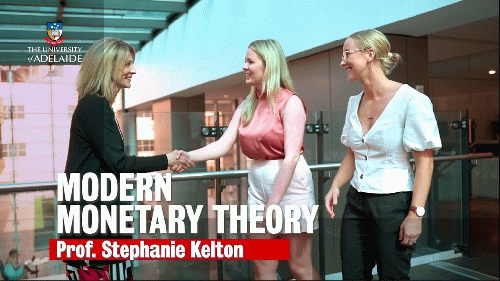I read "Biden Can Go Bigger and Not 'Pay for It' the Old Way" by Economics Professor and MMT advocate Stephanie Kelton. It is an important read that we need to understand.
See full episodes here.
Ironically Professor Kelton shared some concerns with former Obama economist Larry Summers. Infusing the economy can eventually be inflationary.
It's easy to ramp up spending when there are millions of unemployed people who can be hired and plenty of domestic companies eager to supply the government with solar panels and electric vehicles. But what happens when it gets harder to find the idle things and people construction workers, architects, machinery, raw materials and so on needed to keep pace with an enormous revamp of our nation's infrastructure? With the U.S. economy now improving, it would be irresponsible not to develop a rollout plan for those contingencies.
If there is a large shortage of workers, wages will go up, a good thing. The problem is that a shortage of workers is a double edge sword. It will mean a shortage of products which also means the price of products and services will increase as well.
While President Biden is paying for the infrastructure bill by taxing corporations and the rich, the fact that the marginal spending of the rich into the economy is likely to be unchanged, it provides no dampening effect to inflation. But we do want prosperity for those now making more money. But an economy not managed well, could have inflation eat up much of that prosperity.
Kelton points out several solutions to avoid the shortages that would occur with people having more money to spend.
These nontax inflation offsets could include industrial policies, like much more aggressively increasing our domestic manufacturing capacity by steering investment back to U.S. shores, using even more "carrot" incentives like direct federal procurement, grants and loans, as well as more "sticks" like levying new taxes to discourage the offshoring of plants. Reforming trade policies is another option: Repealing tariffs would make it easier and cheaper for American businesses to buy supplies manufactured abroad and easier for consumers to spend more of their income on products made outside of our borders, draining off some domestic demand pressures.
The Biden team could also consider loosening its legal-immigration policies, so that even once America nears full employment there would still be an adequate labor pool to meet the increased demand for workers. Putting aside the obvious climate benefits of tightening environmental regulations, banning fracking on federal lands and offshore drilling in federal waters could free up people and materials for other activities. Health care reform could have a role too. (Significantly lowering the Medicare eligibility age would sharply reduce aggregate spending in the health care industry, a major source of price pressures in the economy.)
Over time, the Biden plan's investments in our physical and human infrastructure will enhance our economy's productive capacity, leaving us with a better educated and more productive work force, more efficient railways, less congested roadways, improved technologies and much else. But this can't happen overnight. It will take years, and it might mean that we start to run out of available capacity as we go especially if the House Progressive Caucus wins the addition of trillions more dollars. No one can predict exactly when, or across which industries, serious bottlenecks and other shortages might emerge.
Kelton points out that while "Buy America" is well-intentioned, as our economy heats up, the policy is ill-advised as we can mitigate inflationary pressures by using the world as a heatsink giving international capacity. A prosperous America where people have a lot of money to spend helps the entire world.
This "buy American" philosophy is well intentioned but could lead to counterproductive trouble, particularly since the president has promised that "no one making under $400,000 will see their federal taxes go up" a pledge that takes raising taxes on the middle class, which has a higher marginal propensity to spend, off the table as a potential inflation offset.
A Biden-led plan that is overly protectionist is a much greater inflation threat than a plan that isn't paid for in the traditional deficit-neutral budgetary sense. This framework based on the principles of Modern Monetary Theory redefines fiscal responsibility by flipping the age-old question "How will you pay for it?" The real challenge is "How will you resource it?"
The last four paragraphs of Stephanie Kelton's article is the coup de grace.
By focusing on how much revenue they think they can raise from a broad array of tax increases on the well-off, Democrats risk allowing the scope of their ambitions to be governed by the dated framework of fiscal responsibility in Washington and the political appetite for tax increases, rather than what is truly possible based on logistics in the real economy.
(Note: You can view every article as one long page if you sign up as an Advocate Member, or higher).







